| |
Material de Apoyo
Actualizado: Octubre, 2021 |
 |
 |
Documentos de trabajo
Fuentes disponibles para abordar estudios inter/transdisciplinarios en las RR.II
|
| Michael MCCGwire. (2002). "Shifting the paradigm", International Affairs, Vol. 78, pp. 1-28. |
| Babette B. Babich. (2003). "Kuhn's paradigm' as a parable for the Cold War: incommensurability and his discontents from Fuller's Tale of Harvard to Fleck's Unsung Lvov", Social Epistemology, Vol. 17, nos. 2 & 3, pp. 99-109. |
| Gary Browning, Abigail Halcli and Frank Webster. (2000). Understanding Contemporary Society: theories of the Present, Sage Pub, Ch. 1: "Theory, theorists and themes: a user´s guide to understanding the present", pp. 1-21. |
Julianne Cheek; Noel Gough. (2005). Resarch Methods in the Social Sciences. Sage Pub, Ch. 36: "Posmodernist perspectives" (pp. 302-309). |
| José Padrón (2007). "Tendencias epistemológicas de la investigación científica en el siglo XXI", Cinta de Möbius, Nro. 028, marzo, pp. 1-28. |
| Philip Graham; David Rooney. (2001). "A sociolinguistic approach to applied epistemology: examining technocratic values in global 'knowledge' policy", Social Epistemology, Vol. 15 No. 3, pp. 155-169. |
| Amelia Hadfield. (2004). "Paradigm warfare: the way of the future for IR", BSIS Journal of International Studies, Vol. 1, pp. 57-72. |
| Robert Jervis. (2006). "Understandings Beliefs", Political Psychology, Vol. 27 No. 5, pp. 641-663 |
| Molly Cochran. (2002). "Deweyan Pragmatism and Post-Positivist Social Science in IR", Millennium: Journal of International Studies, Vol. 31, No. 3, pp. 525-548. |
| Alexander Thompson. (2006). "Coercion Through IOs:
The Security Council and the Logic of Information Transmission", International Organization, Vol 60, Winter, pp. 1–34. |
| Steve Fuller. (1999). "The Science Wars : who exactly is the enemy?", Social Epistemology, Vol. 13, Nos. 3& 4, pp. 243-249. |
| François Simiand. (2003). "Métodoo histórico y ciencia social", EMPIRIA. Revista de Metodología de Ciencias Sociales. N.° 6, pp. 163-202. |
| Alain Van Hiel; Ivan Mervielde. (2003). "The Measurement of Cognitive Complexity and Its Relationship With Political Extremism", Political Psychology, Vol. 24, No. 4, pp. 781-801. |
| Paula Saukko. (2003). Doing Research in Cultural Studies. An Introduction to Classical and New Methodological Approaches, Sage Pub., Part one: Thinking Methodologically, Ch. 1: "Combining Methodologies in Cultural Studies" (pp. 11-35); and Part II:
Studying Lived Experience, Ch. 2: "Studying Lived Resistance" (pp. 39-54). |
| Russell K. Schutt. (2009). Investigating the Social World, Sage Pub, 6th. ed., Ch.1, Ch.2, Ch. 3, Ch.5, Ch. 10a y Ch. 10b., Ch13. |
| Dahlia K. Remler; Gregg G. Van Ryzin. (2011). Research Methods in Practice, Sage Pub., Ch. 1 and y Ch. 13. |
| Daniel F. Chambliss; Russell K. Schutt. (2009). Majing Sense of Social World. Methods of Investigation, 2th ed., Sage Pub., Ch. 3; Ch. 7; Ch. 11. |
| Judith Bara; Mark Pennigton. (2009). Comparative Politics, Sage Pub., Introduction and Ch.1. |
| Roger Pierce. (2008) Research Methods in Politics, Sage Pub., Ch. 1 and Ch. 7 |
| Celine-Marie Pascale (2011). Carthographies of Knowledge. Exploring Qualitative Epistemology, 2nd. ed., Sage Pub., Ch. 1 and Ch. 4. |
| Melanie Birks; Jane Mills. (2010). Grounded Theory. A Practical Guide, Sage pub., Ch.1 |
| Martyn Hammersley. (2010). Methodology, Who Need It ? Sage Pub., Ch. 1. |
| Jennifer Mason; Angela Dale. (2010). Understanding Social Research. Thinking Creatively about Methods, Sage Pub., Ch. 1. |
| Thomas R. Lindlof. (2010) Qualitative Communication Research. Sage Pub., 3rd. ed., Ch. 1 and Ch. 3. |
| Tim May, Beth Perry. 2010). Social Researh and Reflectivity. Sage Pub., Ch. 1 |
| Charles C. Ragin; Lisa M. Amoroso. (2010). Constructing Social Research. The Unity and Diversity of Methods, 2nd. ed., Sage Pub, Ch. 1 and Ch. 5. |
| John W. Creswell; Vicky L. Plano Clark. (2010). Designing and Conducting Mixed Methods Research, 2nd. ed., Sage Pub., Ch.1 and Ch. 3. |
| Peter Swanborn. (2010). Case Study Research. What, Why and How? Sage Pub., Ch. 1. |
| Raymond Madden. (2010). Being Ethnographic. A Guide to the Theory and Practice of Etnography, Sage Pub., Introduction and Ch. 1. |
| Christian Heath; John Hindmarsh, Paul Luff. (2010). Video in Qualitative Research, Sage Pub., Ch. 1 and Ch 2 |
| Nigel King; Christine Horrocks. (2010). Interviews in Qualitative Research , Sage Pub., Ch.1. |
| Janet Salmons. (2010). Online Interviews in Real Time, Sage Pub., Ch. 1 and Ch. 6 |
| David. M. Fetterman. (2009). Ethnography. Step-by-Step. Sage Pub., preface and Ch. 1. |
| Robert N. Kozinets. (2010). Netnography. Doing Ethnography Research Online. Sage Pub., Ch. 1 and Ch. 2. |
| John Baylis; Stephen Smith. (2004). The Globalization of World Politics. An Introduction to International Relations. Oxford University Press, To see: Steve Smith, Patricia Owens, 'Alternative approaches to international theory' (pp. 271-293); and James D. Kiras, 'Terrorism and Globalization' (pp. 479-498). Also, IR Theory in Practice Case Study: 'The Gulf War, 1990-1991'; 'The Iraq War, 2003'; 'The 1999 Kosovo Crisis'. |
| Daniel Drukman. (2005) Doing Research. Methods of Inquiry for Conflict Analysis, Sage Pub. To see Ch. 1: 'Why Do Research?'; Ch. 3: 'Designing Experiments' and Conducting Simulations'; Ch. 5: 'Survey Research'. |
| Marianne W. Jorgensen; Louise J. Phillips. (2002). Discourse Analysis as Theory and Methods, Sage Pub.; Ch. 1: 'The Field of Discourse Analysis' (pp. 1-23); Ch. 6: 'Critical Social Constructionist Research' (pp. 175-212). |
| Malcolm Williams; Tim May. (1996). Introduction to the Philosophy of Social Research, Routledge, London, Ch. 1: 'Introduction'; Ch. 2: 'What is science?´; Ch. 3: 'Philosophy, social science, and methods'; Ch. 4: 'Knowing the social world'; Ch. 6: 'Philosophical issues in de process of social research'; Ch. 7: 'Poststructuralism, postmodernism, amd social research'; Ch. 8: 'Conclusion'. Also: 'Key definitions'. |
| |
| Eventos
|
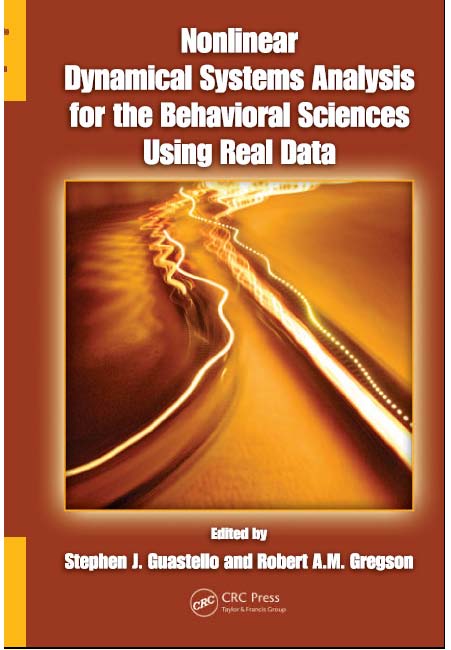 |
Publicaciones
'Nonlinear Dynamical Systems Analysis for the Behavioral Sciences Using Real Data', by
Stephen J. Guastello & Robert A. M. Gregson, Editors. |
| A compilation of research methods reflecting the expertise of the major contributors to NDS psychology, this book examines the techniques that have proven to be most useful in the behavioral sciences. The editors have brought together constructive work on new practical examples of methods and application built on nonlinear dynamics. The authors cover dynamics such as attractors, bifurcations, chaos, fractals, catastrophes, self-organization, and related issues in time series analysis, stationarity, modeling and hypothesis testing, probability, and experimental design. The analytic techniques discussed include several variants of the fractal dimension, several types of entropy, phase-space and state-space diagrams, recurrence analysis, spatial fractal analysis, oscillation functions, polynomial and Marquardt nonlinear regression, Markov chains, and symbolic dynamics. This book is designed to develop skill and expertise in framing dynamical hypotheses and in building viable analytic models to test them. It addresses topics and methods of current interest in an application driven manner, making the book useful to the behavioral sciences community, as well as those in engineering, medicine, and other fields who are interested in nonlinear dynamics. The authors provide a generous supply of instructions for operating some of the most popular software for nonlinear dynamical systems analysis |
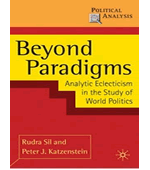 |
'Beyond Paradigms. Analytic Eclecticism in the Study of World Politics'
by Rudra Sil and peter J. Kazenstein, Palgrave macmillan, 2010.
Leer: 'Contents' y Ch. 1: 'Analytic eclecticism' |
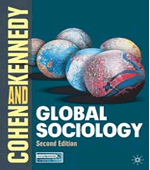 |
'Global Sociology'
by Robert Cohen and Paul Kennedy, Palgrave macmillan, 2007.
Leer: 'Contents' e 'Introduction' |
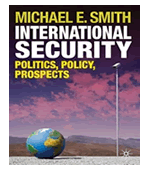 |
'International Security. Politics, Policy, Prospects'
by Michael E. Smith, Palgrave macmillan, 2010.
Leer: 'Contents' y Ch.1: 'International Relations and International Security' |
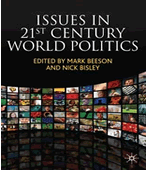 |
'Issues in 21st. Century World Politics'
by Mark Beeson y Nick Bisley (Ed.), Palgrave macmillan, 2010.
Leer: 'Contents' y Ch. 1: 'Globalisation and Statehood'. |
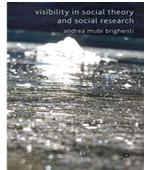 |
'Visibility in Social Theory and Social Research
by Andrea Mubi Brighenti, Palgrave macmillan, 2010.
Leer: 'Contents' y Ch.1: 'Visuality and Visibility' |
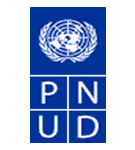
|
|
"Measuring HDI Measurements; Why the New Model Works best" By Eduardo Zambrano (Jan 10, 2011). |
to see: link |
"Subtracting GNI from the HDI: A ‘non-income’ Human Development Index-" By Hyung-Jin Choi, Martin Heger, José Piñeda and Francisco Rodríguez. (Jan. 10, 2011).
|
to see: link |
"What the New HDI tells us about Africa". By Francisco R. Rodríguez. (Dec. 08, 2010) |
to see: link |
"The North African Miracle". By Francisco Rodríguez and Emma Samman. (Nov. 12, 2010).
|
to see: link |
"How can Human Development improve your life, your community or country?" By Visitors of the HDR (Annual Report). |
to see: link |
"Multidimensional Poverty Index: How should we measure poverty?". By Sabina Alkire (August 3, 2010). Visitors of the HDR (Annual Report).
|
to see: link |
"What is Human Development?". (2010) |
to see: link |
"Pushing the Frontiers of Human Development". By jeni Klugman (Feb 11, 2010).
|
to see: link |
| The HDI Tree: A Visual Representation by César A. Hidalgo, Alex Simoes and isabel Meirelles. (Feb. 28, 2011). |
to see: link |
International Women's Day: A Century of Advocacy |
to see: pdf |
The Gender Inequality Index (GII) |
to see: pdf |
| The Gender Inequality Index -Table- |
to see: pdf |
|
|
|
Información académica |
 |
Posgrados virtuales
Un panorama de posgrados a nivel de cursos, especializaciones, maestrías o doctorados dictados en modalidad semipresencial o no presencial.
|
'Maestría en Metodología de la Investigación Científica' 2021
Maestría en Metodología de la Investigación Científica
Directora. Dra. Cristina Ambrosini
La Maestría te brindará una formación integral no prevista en las carreras de grado, que incluye la reflexión acerca de las características del conocimiento científico, así como también sobre las modalidades de producción del saber en su interacción con el resto de las prácticas sociales.
La carrera posee una modalidad semipresencial (no virtual), con la combinación de una metodología propia de cursos a distancia (plataforma moodle) con clases teóricas de presencia obligatoria, que se realizan una vez al mes, los días viernes y sábados de 10 a 18 hs. en la sede Remedios de Escalada de nuestra Universidad. Para aprobar los módulos es obligatorio cumplir con el 80% de asistencia a las clases presenciales, estar presente en las instancias virtuales y rendir un final presencial por cada módulo cursado.
El egresado de la Maestría de la Universidad Nacional de Lanús cuenta con un perfil sólidamente académico y está formado para:
· Asesorar a grupos de investigación en cuestiones relativas a la elaboración de diseños y proyectos de investigación.
·Integrar o dirigir proyectos de investigación acordes con su formación profesional.
·Impartir enseñanza básica sobre dichas cuestiones.
·Gestionar carreras de grado y posgrado.
·Formar parte como Jurado de concursos de grado y Defensas de tesis de posgrado.
·Presentar marcos teóricos epistemológicos como sustento a desarrollos metodológicos investigativos y docentes.
·Diseñar, ejecutar y evaluar proyectos de investigación en el ámbito de las distintas disciplinas científicas.
·Participar activamente de los procedimientos de administración e la ciencia.
·Participar, en general con argumentos coherentes y fundados, en el debate contemporáneo acerca de la crisis científico social de nuestro tiempo en ámbitos académicos y en diversos foros de opinión pública.
Plan de Estudios
El programa de la Maestría en Metodología de la Investigación Científica está articulado en cinco módulos que contemplan tanto los aspectos teóricos de formación epistemológica general -acerca de las características de la práctica científica en general y de su relación con el conocimiento científico y con la sociedad en particular- como los aspectos prácticos de diseño, implementación y evaluación de proyectos de investigación en el campo de las ciencias naturales y en el de las ciencias sociales, así como en el de las indagaciones humanísticas y artísticas.
Por tratarse de una carrera cuya matrícula es multidisciplinar, existe un curso de nivelación para los estudiantes provenientes de carreras que no contemplen en su plan de estudios asignaturas teórico-metodológicas en un 30% de su currícula, ni acrediten méritos equivalentes. La Comisión Evaluadora de la MIC, analizará los antecedentes e indicará quienes deben hacer dicho curso que se realizará mediante aula virtual y culminará con la entrega de un trabajo por el mismo medio
GRILLA DE CURSADA |
1º Cuatrimestre |
2º Cuatrimestre |
|
|
|
1º Año |
Epistemología y Lógica |
Metodología de la Investigación Científica |
2º Año |
Procesamiento y Análisis de Datos |
Administración y Gestión de la Investigación |
3º Año |
Tutorías |
Seminario de Tesis |
|
|
|
Duración total estimativa 23 meses, más la Tesis
|
|
Congresos, Jornadas y Comunicaciones |
 |
The call for papers
CALL FOR PROPOSALS
DEADLINE: April 30
9th EUROPEAN CONGRESS OF METHODOLOGY
2021
University of Valencia - Spain
VIRTUAL PRESENTATIONS
link: https://esdeveniments.uv.es/22691/detail/european-congress-of-methodology.html
*
CHAOS THEORY in PSYCHOLOGY & LIFE SCIENCES
Dear Nonlinear Colleagues,
I am writing you personally to encourage you to join this vibrant organization, the Society for Chaos Theory in Psychology & Life Sciences (SCTPLS) -- or renew your membership if you haven't already done so. Automatic subscriptions to
-
Our journal Nonlinear Dynamics in Psychology & Life Sciences (NDPLS)
-
Our information-rich quarterly Newsletter
-
The prized annual SCTPLS nonlinear art poster
-
Society news via our member mailing list, Listserv, and Linked-In group
-
Member rates for our cutting-edge conferences
*
Revista Desarrollo Humano
Revista Latinoamericana de Desarrollo Humano (PNUD) convoca para la publicación de artículos/Call for papers. Los interesados pueden consultar: http://www. revistadesarrollohumano.org. Esta propuesta está enmarcada en la Red de los equipos de Desarrollo Humano, una agrupación de miembros de los equipos de Desarrollo Humano del PNUD en América Latina y el Caribe, cuyo objetivo es compartir conocimiento y experiencias resultantes del proceso de elaboración de los Informes Naciones de Desarrollo Humano y otras investigaciones. Para cumplir esta misión, la Red ha creado instancias virtuales, como la Revista mencionada, y actividades presenciales como las Reuniones Anuales de la Red que congregan a los coordinadores de los Informes Nacionales de Desarrollo Humano.
IRS (International Relations Society)
UNIVERSITY OF TORONTO
Journals for IR-Related Undergraduate Work.
*
.
The Mosaic Institute, a peace and conflict think tank, is looking for 5-10 undergraduate students to prepare an important report on the subject of relations between ethnocultural groups on campus. The report will be used internally by the Mosaic Institute to guide its university programming expansion and will be communicated to key stakeholders of the organization. The final project will have the potential to be published as a research report of the Mosaic Institute and distributed publicly via the website. 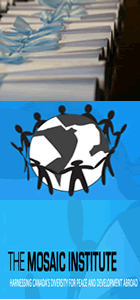
Interested participants should contact Melinda Jacobs at melinda.jacobs@utoronto.ca in order to receive the complete information package and application. Please include MOSAIC RESEARCH OPPORTUNITY in the subject line of your email. The deadline for applications is January 15th by 12 PM.
For more information on the Mosaic Institute, please visit: http://www.mosaicinstitute.ca/
*
International Issues Discussion Series talk on India and Pakistan
The International Issues Discussion (IID) series at Ryerson University is pleased to present the first talk in its special Winter 2011 series, Into the Divide: A Forum on India and Pakistan in the World Today. The guest will be Dr. Amitabh Mattoo, Professor of International Studies at Jawaharlal Nehru University and the Director General of the Institute for Peace and Conflict Studies in New Delhi. He previously served with the National Knowledge Commission as a top advisor to the Indian Prime Minister, and he is currently le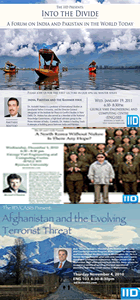 ading Track II attempts at building peace with India and Pakistan. His talk is entitled: "India, Pakistan, and the Kashmir Crisis" . Founded in 2005, the IID is a non-partisan, student-led forum designed to engage all members of the Ryerson University community on major events and issues in contemporary global affairs through reasoned, objective, and scholarly discourse. For further details about the IID and our series, please see www.iid.kislenko.com or contact IID students leaders at Ryerson.international.issues@gmail.com ading Track II attempts at building peace with India and Pakistan. His talk is entitled: "India, Pakistan, and the Kashmir Crisis" . Founded in 2005, the IID is a non-partisan, student-led forum designed to engage all members of the Ryerson University community on major events and issues in contemporary global affairs through reasoned, objective, and scholarly discourse. For further details about the IID and our series, please see www.iid.kislenko.com or contact IID students leaders at Ryerson.international.issues@gmail.com
|
|

